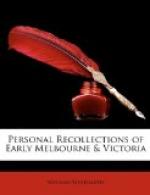Old friends and old times.
Then I turned to the old and early friends of the past. Some of them kindly called; others, less able, I had myself to seek out. Thus I met, besides Mr. J.S. Johnston, already mentioned, Mr. J.A. Marsden, Mr. Alfred Woolley, Mr. E.B. Wight, Mr. Damyon, Mr. Brahe, Mr. John Barker, Mr. R.W. Shadforth, the Messrs. Ham, and Dr. Black. Mr. Germain Nicholson, another old and worthy friend, was in Sydney, where he called for us, but we have not yet met. I found time to reach Sir William Stawell at his pleasant suburban residence at Kew, and was most agreeably disappointed to find the veteran head of the law very much more like his former self than report had accredited him. Another old friend, Sir Francis Murphy, I have as yet failed to meet, and also Mr. David Moore. Mr. Francis Henty drove us to the St. Kilda-road to pay our respects to Mrs. Edward Henty, who pleasantly surprised us with as yet hardly the marks of age, and as though fully intending to see at least one generation more of the progress of the great colony which her departed husband had founded. Mrs. D.C. McArthur was still residing at Heidelberg along with her nieces, Miss Wright and Mrs. Were, the widow of my late old and intimate friend, Mr. J.B. Were. I saluted the former as the venerable mother of Melbourne society, and being thus one of her sons I claimed and exacted the full salutation of sonship. I claimed the same privilege from my other dear old friend, Mrs. A.M. McCrae, whom I found hardly changed, in vigour of mind at least, although now eighty-five years of age. Almost next door was Mrs. Henry Creswick, daughter of my old friend Dr. Thomson, of Geelong, of whom, as one of the very earliest, and only a few months behind Batman himself, I have already spoken. We enjoyed a chat over the very oldest Victorian times.
The benevolent Asylum.
I had one opportunity of taking “old friends and fellow-colonists” in a wholesale fashion. The committee of the Benevolent Asylum complimented me by so pressing an invitation to visit an institution which I remembered and was interested in from its first commencement, that it was imperative on me to find the time to do so. The spectacle was alike most edifying and most interesting. The institution had enormously extended since my time, both in its accommodation and the number of its inmates. There were nearly 700 men and women, all of them helpless and destitute, and nearly all passed into old age. Some who were paralyzed in their lower limbs, and unable to move about, were put out in a sheltered place in the sunshine, to busy themselves in various ways of their own choosing, and we particularly noted two rather pretty young women, whose lively expression of face indicated no lack of happiness, and whose neat and nimble fingers turned out quantities of daily work. There was a considerable section of the




